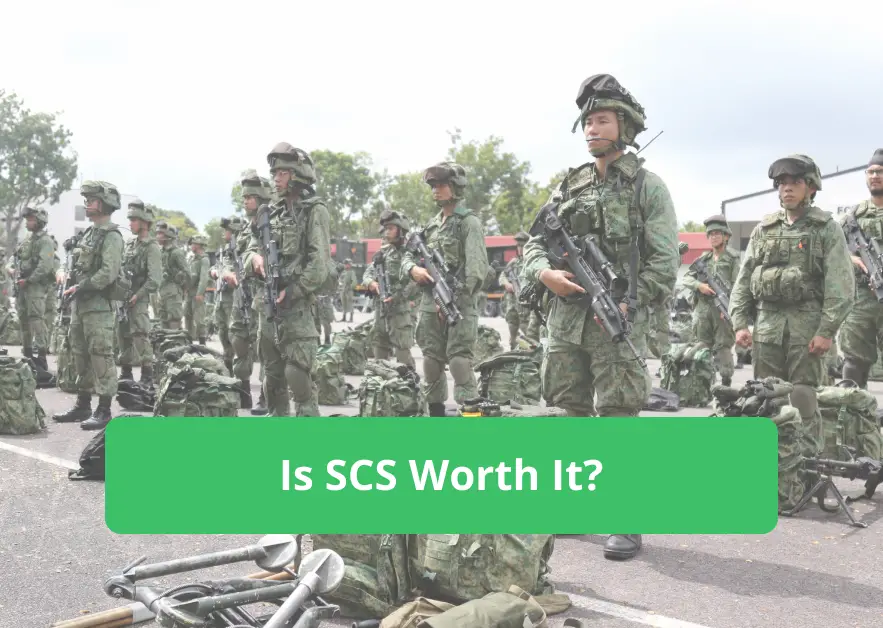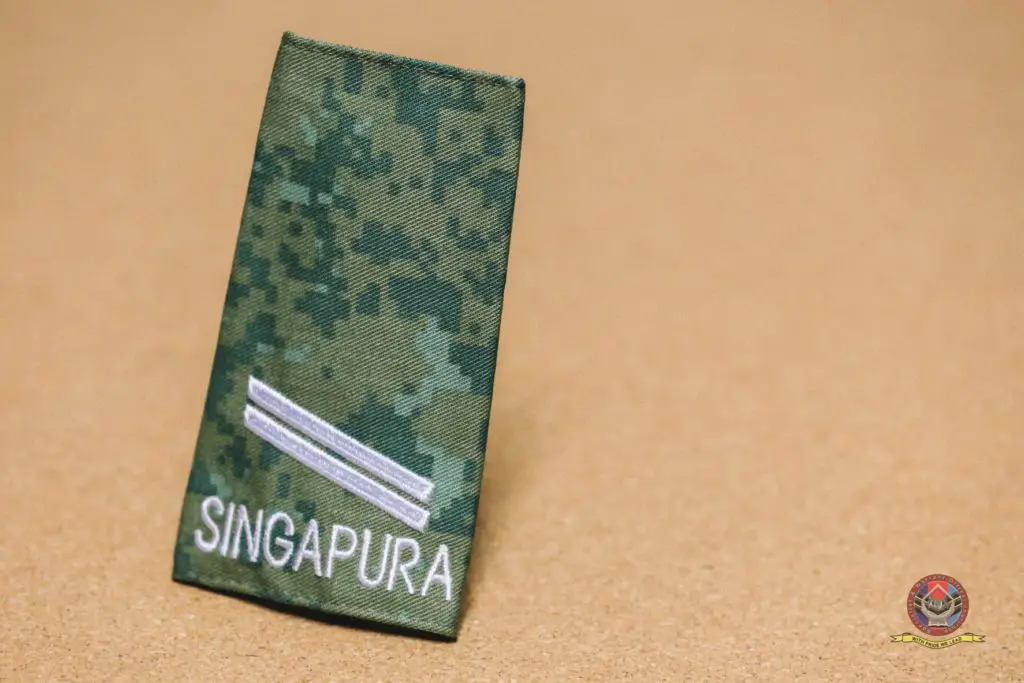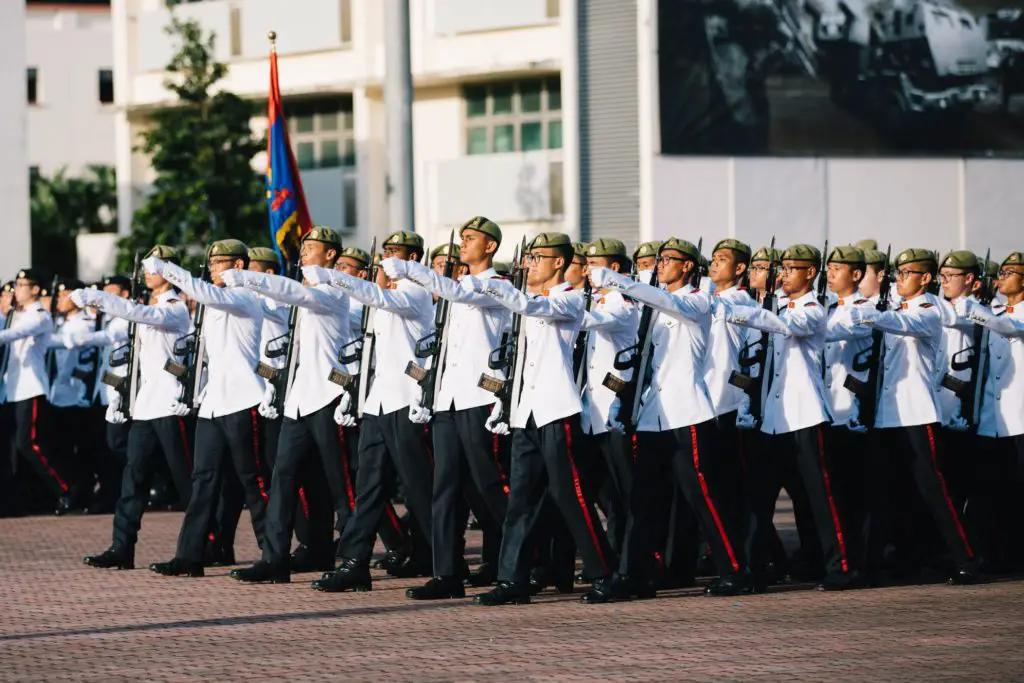You’re at the start of your National Service (NS) journey and you’ve heard about the Specialist Cadet School (SCS) from your buddies, but what exactly is life like within?
As a 3SG who has gone through the course, here’s what you need to know:
Contents
How do I get into the SCS course?
It is possible to indicate your interest in command school during Basic Military Training (BMT). Usually, the commanders will conduct a written survey on which NS route you would prefer.
Moreover, there will be interviews in which you can express your interest in leadership roles.
Your fitness performance, leadership capabilities and your education level will also determine your placement.
Your commanders will also be on the lookout for who to recommend for SCS. To stand out from the group, do take the initiative to help out in spite of feeling fatigued during training. Moreover, there will be a Situational Test (SIT test) at the end of the field camp to assess problem-solving skills.
How you handle various situations with your section mates will go a long way in determining your place in SCS.
Be sure to make use of the field camp to show your worth!
How long is the SCS course?
The 22-week SCS journey splits into three periods:
- Foundation Term
- Professional Term
- Combined Arms Term
#1 The Foundation Term
This is where all cadets go through a course in which they teach basic infantry skills. You will train to become a Specialist of the SAF. Activities during this period include technical handling lessons of more infantry weapon systems. Live firings of these weapons follow.
There will be outfield exercises, such as:
- Exercise Tenderfoot – Navigation training
- Exercise Grandslam – Conventional Operations and Urban Operations
And miscellaneous lessons such as:
- National Education
- Chemical Defence
- Guard Duty Training
You can find out more about guard duties during NS here.
The Sergeant Rocky challenge is also conducted at the end of the term. It is a 16km Route March that includes various stations of Foundational Term tests. This will happen through the night. Trainers will inform you about your posting in the Professional Term in the morning after.
Cadets posted to the Infantry will be called out through a ceremony. Usually, the remaining cadets will learn their postings later in the afternoon.
This is quite exciting as the vocation posting is where you will spend the remaining 2 years.
#2 The Professional Term
During this term, you will be assigned to the various formations in the Army. You will learn vocation-specific skills at the respective training institutes for a duration of 12.5 weeks.
These are the possible institutes and vocations you may be posted to:
- Specialist Cadet School (Infantry)
- Island Defence Training Institute (Military Police)
- SAF Military Intelligence Institute (Infantry Recce, Armour Infantry Recce etc.)
- SAF Medical Training Institute (Combat Medics)
- Motorised Infantry Training Institute (Motorised Infantry)
- Engineer Training Institute (Combat Engineer, CBRE/EOD)
- MP Command (Military Police)
- Artillery Institute (Artillery)
- Armour Training Institute (Armour)
- Signals Institute (Signals)
- Sniper Cadet Course
- Naval Military Expert Institute
A summary exercise is usually conducted at the end of the term. During this period, some vocations will train overseas. For example, I went to Taiwan during my Infantry Specialist Cadet course for Exercise Starlight.
My training in Taiwan was a three-week event that consisted of Exercise Longstride and Exercise Warrior. This includes navigation, conventional attack and defence in mountainous regions. It was an interesting experience for me to train in the cold weather.
There will be a couple of days of Rest and Recreation (R&R) towards the end of the three weeks. During this period, you can explore Taipei city in Taiwan as a break from the intense training!
#3 The Combined Arms Term
All cadets will come back together for the final Combined Arms Term for a brief 1.5 weeks. You will have lessons conducted by Military Experts on leadership skill experiences. Do learn how the different factions of the Army come together to manage their troopers.
This is also where the preparation for the Specialist Cadet Graduation Parade (SCGP) begins. The Master Trainer of the School will conduct rehearsals until every cadet has met his standard of parade. You will be wearing the SAF Long No.4 with parade gloves to practice in. Additionally, an issued bayonet attaches to the SAR-21 for rehearsals.
In my experience, this was a very tiring process as our Master Trainer had us repeat the entire process many times.
Your family and friends are invited to watch the SCGP. What puts this apart from the BMT Passing-Out Parade is the various vocational SAF No.1 dress uniforms marching together in contingent with their respective coloured berets.
At the end of the parade, your family and friends will come down to the parade square for photographs. You will finally be able to don the rank of a fully-fledged 3SG!
What is life like in SCS?
The journey as an SCS cadet is not an easy one. There will be many intense training sessions to build fitness, learn specialist skills, and outfields.
Physical Training
Since you will need to be a trainer after graduating from SCS, you are expected to have a certain level of fitness. Some of the activities that you will need to be familiar with include:
- Daily morning runs
- Metabolic circuits
- Combat circuits
Combat circuits tend to be the most intensive due to doing military exercises whilst wearing Standard Battle Order (SBO) with the field pack as a weighted bag.
Discipline
SCS is a Warrant Officer and Specialist (WOSpec) organisation, and discipline amongst cadets is crucial. Compared to BMT, the expectations are higher when it comes to day to day aspects of cadet life.
Proper marching standards, military salutations and a no-nonsense behaviour are enforced by the trainers.
Administrative Time
The training objectives of the day will end in the evening. You are free to use the time to rest or use the gym facilities. Often, we would use the time preparing equipment for the next day’s scheduled training and cook our instant noodles.
Nights Out
Depending on how your Company’s Officer Commanding (OC) allows, he/she may allow for time outside of camp in the evening for dinner. Usually, I would go to the nearby Joo Koon MRT mall with my fellow cadets to satisfy our fast food cravings. You may also choose to stay within the camp as time outside is limited to around 4 hours.
During my time, our OC had a rule for which only Individual Physical Proficiency Test (IPPT) Gold achievers could have nights out once a week.
What is the pay like while I’m in SCS?
The monthly allowance does increase from the usual BMT recruit pay of $580 to the specialist cadet pay of $670, along with the full-time National Servicemen IPPT and Marksmanship incentives. You are able to get these incentives once per year for your 2 years in NS.
| Achievement | Additional Incentive |
|---|---|
| IPPT Gold | $300 |
| IPPT Silver | $200 |
| Marksmanship | $200 |
If you’re in a combative vocation such as the Infantry, you will be eligible for additional combat pay:
What haircuts are allowed during SCS?
Sadly, haircuts are another enforced rule. You’ll have to maintain a 2-by-1 short haircut for males. Commanders often give extra weekend duties to cadets for non-regulatory haircuts. I find the enforcement much stricter as compared to the unit I was in after SCS.
The camp does not have a barber like in Tekong, so you’ll need to get your haircut during the weekends.
You can tell your barber to give you the buzz cut which follows the typical haircut length ratio of 2 on the top and 1 at the sides and back.
From my experience, most barbers in Singapore will be familiar with the SAF-required haircut for men.
What tips are there to survive SCS?
Here are 4 tips I have for you to get through SCS:
- Have an open mind towards learning new interpersonal skills
- Understanding and following strict regimentation to build discipline
- Maintain physical fitness
- Make friends
#1 Have an open mind towards learning new interpersonal skills
While the hands-on skills taught may be important to get through SCS, an important factor of cadet life revolves around how you communicate with your fellow buddies. Take the opportunity to talk to your fellow cadets about how you can work out a system of responsibility within the bunk.
Things can get done much faster when everyone works together!
#2 Understanding and following strict regimentation to build discipline
It may seem daunting at first to be under strict regimentation. When you realise how this can improve the way you and your section mates function through standardised practice, the benefits seem to outweigh the bad.
#3 Maintain physical fitness
SCS follows the practice of progressive training. Maintaining physical fitness helps to make the training easier with your fellow cadets to not drag them down!
#4 Make friends
The friends you make during this course will help you to get through tough times during training and administrative periods.
Getting comfortable with the uncomfortable together will make time in-camp seem to pass by.
Is SCS worth it?
The SCS journey was eye-opening for me. Yet the responsibility that comes after is important to keep in mind. If you’re someone unwilling to commit to the role as a Specialist in the SAF, I would not recommend this course to you.
The time spent in SCS is worth it if you make it worth your while. The friends I have made and the interpersonal skills I have learnt was what I took away from the experience.
I would not have done it any other way, as the stories that come from my time in SCS were one of the most memorable.
Conclusion
As a cadet, life in SCS is as interesting as it is tough. At the end of the day, it is about how you want to craft your NS journey as 22 weeks in SCS is a significant part of your 2 years!
If you enjoyed this content, do follow us on Telegram!

Want to earn some money while sharing your experiences in Singapore? We’re always looking for writers and you can join our team here!


